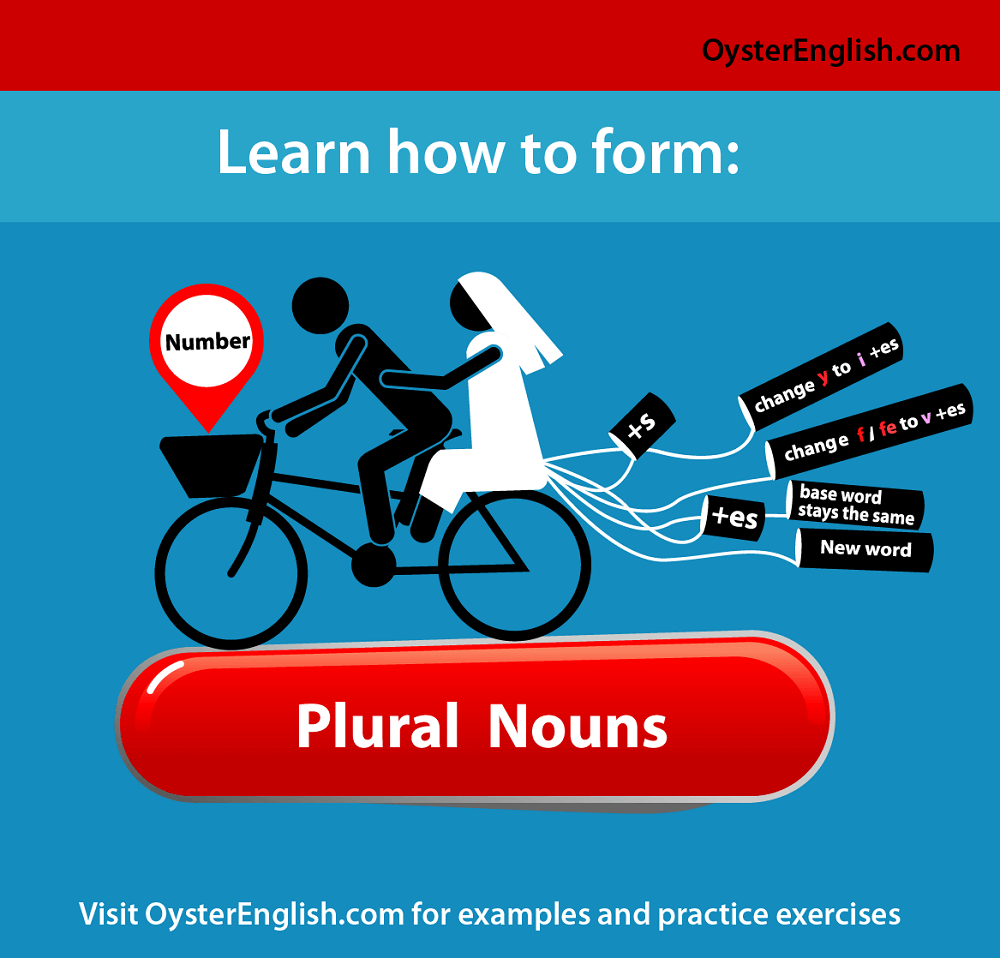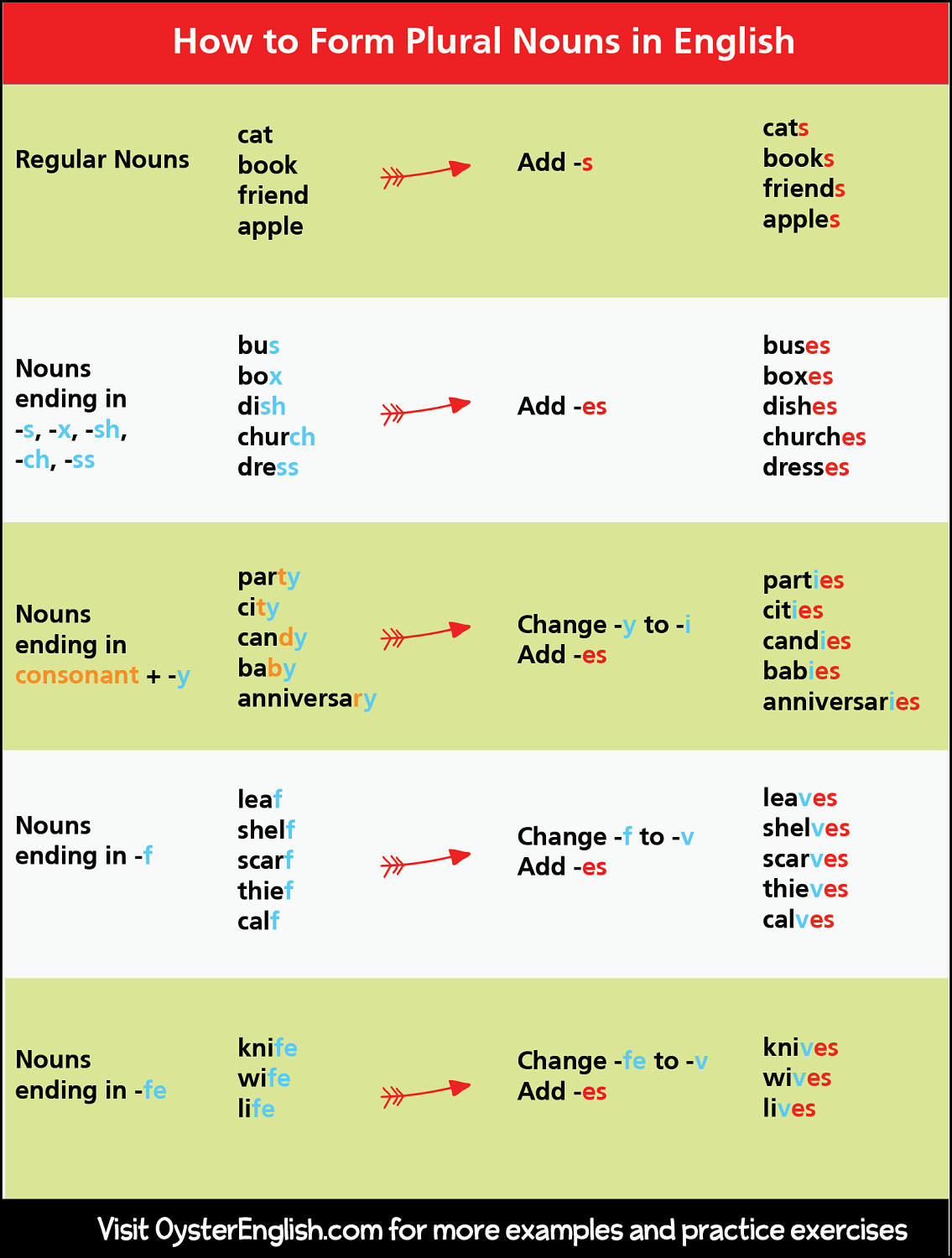All About Plural Nouns
Let's look at the basics for forming and spelling plural nouns, which can be tricky.
There are many exceptions, however there are several tips and tricks that will really help you.
Before we get started, let's quickly review both singular and plural nouns:
Singular nouns name one (single) person, place, thing, animal or idea.
- Examples: apple, culture, finger, cat, bed
Plural nouns name more than one person, place thing, animal or idea.
- Examples: apples, cultures, fingers, cats, beds
(By the way, for an overview of all the different types of nouns, click here).
Regular Plural Nouns
Normally, the plural of a noun is formed by adding -s:
|
Singular ( = 1) dog a month one plant my face this cake |
Plural ( >1) dogs three months several plants their faces these cakes |
Other Ways to Form Plural Nouns
Although we add -s to change most singular nouns to plural nouns, there are many nouns that have a different ending in the plural.
I know what your thinking...aaarrghh!
The reason many of these have spelling changes is to make them easier to pronounce.
For example, if the plural of "bus" were "buss" it would either sound strange or we'd have the same sound. "Buses" is much easier to pronounce.
Luckily, there are a few simple tips and tricks (otherwise known as rules) that will help you:
Rule 1: Add -es Ending for words ending with -s, -x, -sh, -ch, -ss
Look at the end of the word and if it ends in the letters above, you add an -es.
For example:
- words ending in -s: gas — gases, bus — buses, lens — lenses
- words ending in -x: box — boxes, reflex — reflexes, hoax — hoaxes, tax — taxes
- words ending in -sh: brush — brushes , wish — wishes, clash — clashes
- words ending in -ch: lunch — lunches , watch — watches, punch — punches
- words ending in -ss: boss — bosses , kiss — kisses, business — businesses
Rule 2: Change -y to -i and add -es
If a noun ends with a consonant plus a -y, then change the -y to an -i and add -es.
* Did you remember there are 21 consonant letters in the English written alphabet: b, c, d, f, g, h, j, k, l, m, n, p, q, r, s, t, v, w, x, y, z.]
For example:
- blueberry — blueberries [to be clear: blueberry ends with an 'r' (a consonant) and a 'y']
- party — parties
- lady — ladies
- candy — candies
* Be sure to understand that you need a consonant plus a -y at the end of the word. You need both otherwise if the word ends in just a -y it will be regular. [e.g., boy — boys (not boies)]
Rule 3: Change nouns ending in -f or -fe to -ves
If a noun ends with either -f or -fe, change these letters to a -v and add -es.
Examples:
- elf — elves
- self — selves
- knife — knives
- loaf — loaves
- wolf — wolves
*Note: Unfortunately, there are a few exceptions to this rule. Sorry, you'll have to memorize them (see some examples below under irregular plural nouns).
Example: roof — roofs (not rooves)
The chart below can help you remember these few rules.
Irregular Plural Nouns

Unfortunately, some nouns just don't follow any of the rules above when changing from singular to plural.
I know, bummer.
You'll have to memorize these or consult your good friend, Miss Dictionary, if you're unsure.
Nouns ending in -f that don't change to the -ves ending
For example:
|
Singular belief chief brief cliff cuff roof proof puff |
Plural beliefs chiefs briefs cliffs cuffs roofs proofs puffs |
Nouns that are the same in both singular and plural
|
Singular |
Plural |
|
deer sheep moose series scissors bison |
deer sheep moose series scissors bison |
Some nouns that end in -o add -es
Some nouns that end in -o add an -es. You'll have to check your dictionary to be sure of the spelling.
Examples:
- tomato — tomatoes
- potato — potatoes
- hero — heroes
*Remember you normally just add an -s (e.g., euro — euros, video — videos)
Some nouns completely change their spelling
Look carefully at these as sometimes there is only one letter that's different (e.g., man, men). The reason that some of these nouns completely change their spelling is that some of these words are borrowed from Latin or Greek.
Here are some examples:
|
Singular |
Plural |
|
man woman person child foot tooth mouse louse ox cactus syllabus alumnus stimulus hypothesis parenthesis synopsis thesis appendix axis analysis basis crisis diagnosis |
men women people children foot teeth mice lice oxen cacti syllabi alumni stimuli hypotheses parentheses synopses theses appendices axes analyses bases crises diagnoses |
Some nouns have two plural forms
For some nouns, there are two different plural forms. For example:
|
Singular |
Plural |
|
fish shrimp quail trout mango buffalo mosquito tornado scarf hoof |
fish or fishes shrimp or shrimps quail or quails trout or trouts mangos or mangoes buffalo or buffaloes mosquitos or mosquitoes tornado or tornadoes scarf or scarves hoof or hooves |
Some nouns are always used in the plural
We use the following always in the plural form. Many of these things are a single item that has two connected parts.
For example, clothing items that cover the bottom and have two parts for each leg (e.g. pants, shorts, pantyhose). Also, some tools that have two blades or parts are plural.
Clothes: pants, trousers, jeans, leggings, shorts, tights, pantyhose, stockings, pajamas
For the eyes: glasses, goggles, binoculars, sunglasses
tools: scissors, tweezers, pliers, tongs
possessions / ownership: riches, belongings, earnings, valuables
Note: We often say a "pair of" : pair of jeans / a pair of pants / a pair of glasses / a pair of scissors
- I need to buy a new pair of sunglasses.
- I need to buy some sunglasses (not I need to buy a sunglasses).
Final Note: Possessives versus Plural Nouns
Finally, be careful not to confuse plural nouns with possessive nouns.
For example:
- There are two trees in the yard. (two trees = plural of tree).
- The oak tree's leaves are falling to the ground. (possessive: the leaves belonging to this tree are falling).
- Both trees' branches are very long. (both trees possess long branches).
Remember that the possessive uses an apostrophe + -s after the noun. Plural nouns do not use an apostrophe.
- Home Page ›
- Grammar index ›
- Main noun page >
- Plural nouns


